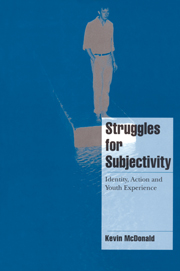1 - Introduction: subjectivity and social experience
Published online by Cambridge University Press: 05 December 2011
Summary
This book sets out to explore the relationship between new experiences of selfhood and new patterns of social life. It is based on three years of fieldwork with young people confronting urgent social and cultural transformations, whose experience of selfhood is unclear, often shaped and determined by social forces that are powerful but difficult, if not impossible, to name. It is an account of actors' struggles to make sense of their subjectivity and of their relationships with other social actors. It explores struggles for identity, and for coherence, attempts to name forms of social creativity, struggles against fragmentation of self. But we also encounter crisis – of embodied subjectivity, of the ability to conflictualise experience and produce social relationship, of the capacity to counter the fragmentation of selfhood. The task of engaging with such struggles and exploring such contemporary experience of crisis is critical if we are to understand the social worlds of many young people today. But beyond this, striving to make sense of such experiences is critical to reconstructing our capacity to make sense of a social world undergoing profound transformation.
Over the past two decades what we once called ‘society’ seems to have given way to a diversity of microgroups and lifeworlds in a way that has profoundly destabilised sociologists. Disciplines like sociology do more than describe; they seek to explain, and sociologists sought to explain the social patterns of industrial society in terms of either social classes (the Marxist tradition) or social institutions (the functionalist tradition), regarding class domination or shared values as the key to patterns of social life.
- Type
- Chapter
- Information
- Struggles for SubjectivityIdentity, Action and Youth Experience, pp. 1 - 14Publisher: Cambridge University PressPrint publication year: 1999

